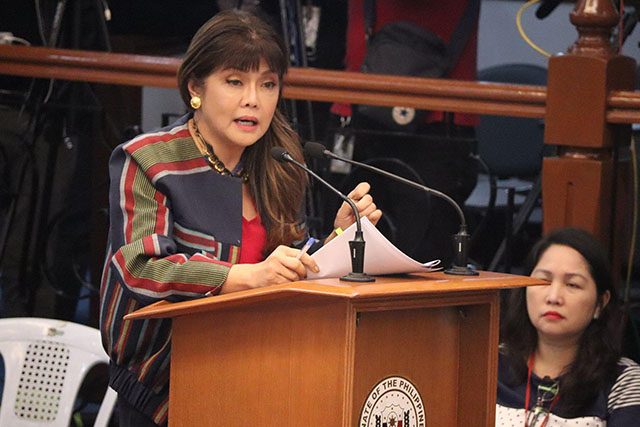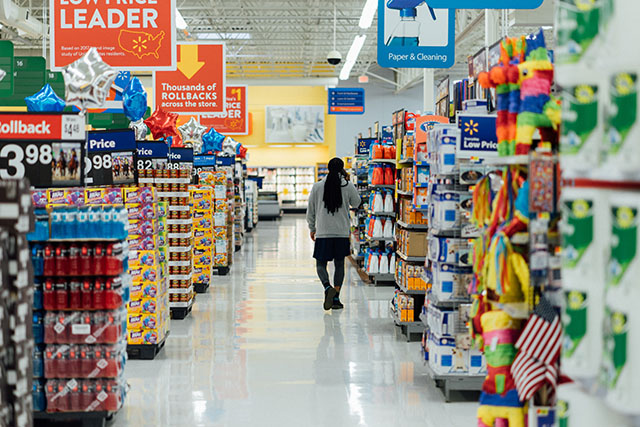
Sen. Imee Marcos was criticized for her remarks about the “astronomical prices” of 24-hour convenience store products compared to its counterparts sold in neighborhood sundry stores or “sari-sari” stores.
She previously condemned convenience stores for supposedly jacking up its prices of basic commodities like canned goods, soap and coffee and urged the Department of Trade and Industry to monitor them for alleged price manipulation.
Part of her remark was quoted by The Philippine STAR, which eventually became viral as Filipinos shared their opinions and reactions about her statement.
“‘Yung Ligo at Young’s Town sardines ay P27 ang isa sa 7-11, samantalang P21 lang ito sa mga sari-sari store. Ang Tide bar, P15 pero kung sa tindahan ka bibili, P11 lang ito. Ang Safeguard soap mabibili mo ng P38 samantalang P29 lang ito. Ang Kopiko, P6, pero P12 sa 7-11. Ano ‘yan, ginto ang presyo?” she said.
The senator added that it is “unconscionable” for convenience stores to “tick off their 24/7 service and the comfort from their air-conditioned outlets to feel at liberty about increasing their prices at will” beyond the suggested retail price.
“Presyo pa rin ang pinag-uusapan dito. Kombinyente ka ngang bumili, pero napakamahal naman ng bilihin, eh, di wala rin! Ano ‘yan, walang magbabantay sa kanila, basta sila na lang ang magdidikta ng kanila presyo?” Marcos continued.
Some Filipinos pointed out that a “sari-sari” store is different from a convenience store in terms of operating expenses, among others.
Madame nasa business model po yan. Magkaiba po ang target market at operating expense ng mga 7-11 vs sari-sari store.
Kailangan nila mag-premium pricing para ma-sustain ang negosyo nila.
Wala pong iniwan yan sa Jolibee at sa mga Buy 1 Take 1 na hamburger sa kanto. https://t.co/IYvt3n4Tbz— Dean Fortun (@dinforcor) September 11, 2019
“Mas mahal talaga ang mga 24 hours convenient stores; malamang 24 hours open so ‘yung cost nila for maintaining the store, electricity etc. mas mataas naman,” another Twitter user wrote.
“But remember that they are 24 hours of service. That means aircon, lights, and electricity on the cold items. Not to forget the night shift differential for the employees on graveyard shift,” a Facebook user pointed out.
“They have people to pay. They have capital expenditures as well that (sari-sari) stores barely have. Consumers have an option to buy there or get it cheaper somewhere else,” the user added.
Marcos also requested for the DTI to field monitoring teams and conduct an inspection to convenience stores’ prices, fearing they might take advantage of the “-ber” months when Filipinos would prepare for the Christmas season.
The Department of Justice previously stated that SRPs are merely “recommendatory” and that there are “no adequate rules or guidelines” about its imposition.

It added that government agencies who imply that SRPs are the “de facto price ceiling” among products are already going “beyond the scope of the Price Act.”
The department said that the government can only impose price control in times of “calamities, disasters and similar situations” but only for basic necessities and prime commodities.
Suggested retail price refers to the “price that customers should pay for the goods according to the manufacturer,” as defined by Cambridge Dictionary.
Basic necessities covered by the SRP scheme include bread, canned fish and other marine products, bottled water, processed milk, locally manufactured instant noodles, coffee, salt, laundry soap, detergent and candles.
Costlier products in convenience stores
Convenience store products have different prices compared to supermarkets for certain reasons.
Specifically citing 7-Eleven, a personal finance website noted that marketing and marginal costs, machine maintenance expenses, rental fees and overnight staff are some of the factors to be considered in terms of product pricing.
“The aggressive marketing strategy 7-Eleven adopts cost them a lot. Brand recognition makes 7-Eleven what it is today; they stand out from other convenience stores,” Dollars and Sense reported.
It added that its machines specifically used for Slurpees and hot coffee, for example, require technicians to maintain who also needed to get paid.
The website also mentioned that 7-Eleven offers other services for the sake of convenience.
People can pay their bills, loans and credit card through its branches, particularly in its CLiQQ kiosk. They can also surf the internet since it has wi-fi service.
“For 7-Eleven to make these services available, they do have to pay the companies a (probably significant) fee,” it explained.
Dollars and Sense added that the convenience store pays “higher rent” since it has a smaller space.
Further, it needs additional staff to man the store overnight, which obliges them to give night differential pay on top of the staff’s basic salary.









